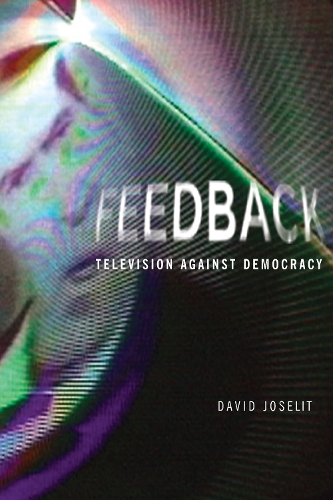
Feedback: Television against Democracy
(Paperback)
Publishing Details
Feedback: Television against Democracy
By (Author) David Joselit
MIT Press Ltd
MIT Press
26th February 2010
United States
Classifications
Professional and Scholarly
Non Fiction
Television
302.23450973
Physical Properties
Paperback
232
Width 152mm, Height 229mm, Spine 11mm
431g
Description
In a world where politics is conducted through images, the tools of art history can be used to challenge the privatized antidemocratic sphere of American television.American television embodies a paradox- it is a privately owned and operated public communications network that most citizens are unable to participate in except as passive specators. Television creates an image of community while preventing the formation of actual social ties because behind its simulated exchange of opinions lies a highly centralized corporate structure that is profoundly antidemocratic. In Feedback, David Joselit describes the privatized public sphere of television and recounts the tactics developed by artists and media activists in the 1960s and 1970s to break open its closed circuit. The figures whose work Joselit examines-among them Nam June Paik, Dan Graham, Joan Jonas, Abbie Hoffman, Andy Warhol, and Melvin Van Peebles-staged political interventions within television's closed circuit. Joselit identifies three kinds of image-events- feedback, which can be both disabling noise and rational response-as when Abbie Hoffman hijacked television time for the Yippies with flamboyant stunts directed to the media; the image-virus, which proliferates parasitically, invading, transforming, and even blocking systems-as in Nam June Paik's synthesized videotapes and installations; and the avatar, a quasi-fictional form of identity available to anyone, which can function as a political actor-as in Melvin Van Peebles's invention of Sweet Sweetback, an African-American hero who appealed to a broad audience and influenced styles of Black Power activism. These strategies, writes Joselit, remain valuable today in a world where the overlapping information circuits of television and the Internet offer different opportunities for democratic participation. In Feedback, Joselit analyzes such midcentury image-events using the procedures and categories of art history. The trope of figure/ground reversal, for instance, is used to assess acts of representation in a variety of media-including the medium of politics. In a televisual world, Joselit argues, where democracy is conducted through images, art history has the capacity to become a political science.
Reviews
An elegant, passionately argued, and crucially important rallying cry...There may be hope that this call to arms for the fields of art history and criticism will not go unheeded.
Ulrich Baer, Modern Painters[Joselit's] wonderfully spare text focuses on the first hints of the digital future as it was mapped by commercial network executives on the clunky hardware of the cathode-ray tube and the dumb black boxes that decoded the increasingly privatized information stream of cable TV.
Caroline A. Jones, ArtforumAuthor Bio
David Joselit is Professor of Art, Film and Visual Studies at Harvard University. He is the author of Infinite Regress- Marcel Duchamp 1910-1941, Feedback- Television against Democracy (both published by the MIT Press), American Art Since 1945, and After Art.
